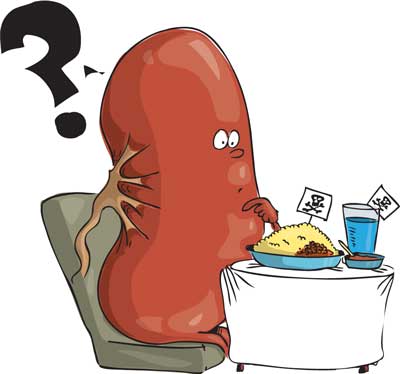Reply To:
Name - Reply Comment
Last Updated : 2024-04-24 11:56:00
Sri Lanka appears to be facing a major kidney problem -- not only physically but also morally and legally. On the physical side there is a kidney disease epidemic mainly in the North Central Province where tens of thousands of farmer families have been affected with more than 10,000 deaths during the past few years. It is officially described as a chronic kidney disease of unknown origin, but most soil scientists and other analysts believe it is directly connected to the excessive use of imported agro-chemicals. Thankfully the National Government is making a ground-breaking initiative to persuade the farmer community to switch from agro-chemicals to organic and regenerative farming.

President Maithripala Sirisena, himself hailing from a Polonnaruwa farmer family, is sowing the good seeds for this mission so that Sri Lanka could produce its own nourishing food without the use of toxic agro-chemicals. This mission for a ‘Wasa Wisa Nathi’ country is being implemented mainly by Agriculture Minister Duminda Dissanayake and the activist parliamentarian the Ven. Athureliye Rathana Thera. We hope that within the next two years Sri Lankans would be able to eat food that is not poisoned or polluted by agro-chemicals and other preservatives.
Today we wish to focus on the moral or legal side of another kidney-related issue. Six Indians who came here to give their kidneys for transplant have been remanded by a Colombo court. The Health Ministry says it is carrying out investigations on how these Indians were brought here to give their kidneys, because it is an offence under Indian laws. When this human organ racket was exposed some months ago, the Health Ministry said it was investigating, though the Indian media disclosed the names of the Colombo private hospitals and the surgeons who carried out these kidney transplants.
According to lawyers appearing for the Indian suspects, about 1,200 such kidney transplant operations have been carried out during the past three years in Colombo’s private hospitals. That means hundreds of Indians have been brought here illegally for these human organ transplant rackets involving hundreds of millions of rupees. The lawyers claim that the Sri Lanka’s Health Ministry has given written approval for these kidney transplants, where poor Indians, suffering below the poverty lines, are known to have sold or sacrificed their kidneys for about half a million rupees. The racketeers who do the wheeler-dealing are alleged to have refused or failed to pay the full amount to the poor Indians after they sacrificed their kidneys for the survival of their families. The surgeons and the private hospitals involved have made no clear statements, while the Health Ministry has not denied the claim by the lawyers that not six, but 1,200 kidney transplant operations were performed here.
Some of the vital questions that arise here are whether Sri Lanka has become a regional centre for human organ transplant rackets, what the Health Ministry has done or failed to do, and ethical issues relating to the surgeons and the private hospitals. If the Health Ministry for some reason cannot or will not do a full diagnosis on this kidney racket, then the Sri Lanka Medical Council -- the governing body for medical ethics -- should inquire and take action. Among other issues, any involvement in an illegal organ-transplant racket involving poor Indian victims will seriously damage the image of the medical profession. In recent decades there have been allegations with substantial evidence that the sacred vocation of healing has now to a large extent become a big profit-making business. Adding organ–transplant rackets to this might bring the health sector itself to a kidney breakdown where it means dialysis.
There are allegations that transnational pharmaceutical corporations or the Big Pharma mafia is giving big doses of sponsorships, scholarships and family pleasure trips to medical consultants and their families. In a further violation of ethics, big private hospitals are now marketing their skills. We hope that besides Government action there will be an inner transformation among doctors and private hospitals to restore a health service where the well-being of patients is treated as sacred.

Add comment
Comments will be edited (grammar, spelling and slang) and authorized at the discretion of Daily Mirror online. The website also has the right not to publish selected comments.
Reply To:
Name - Reply Comment
US authorities are currently reviewing the manifest of every cargo aboard MV
On March 26, a couple arriving from Thailand was arrested with 88 live animal
According to villagers from Naula-Moragolla out of 105 families 80 can afford
Is the situation in Sri Lanka so grim that locals harbour hope that they coul